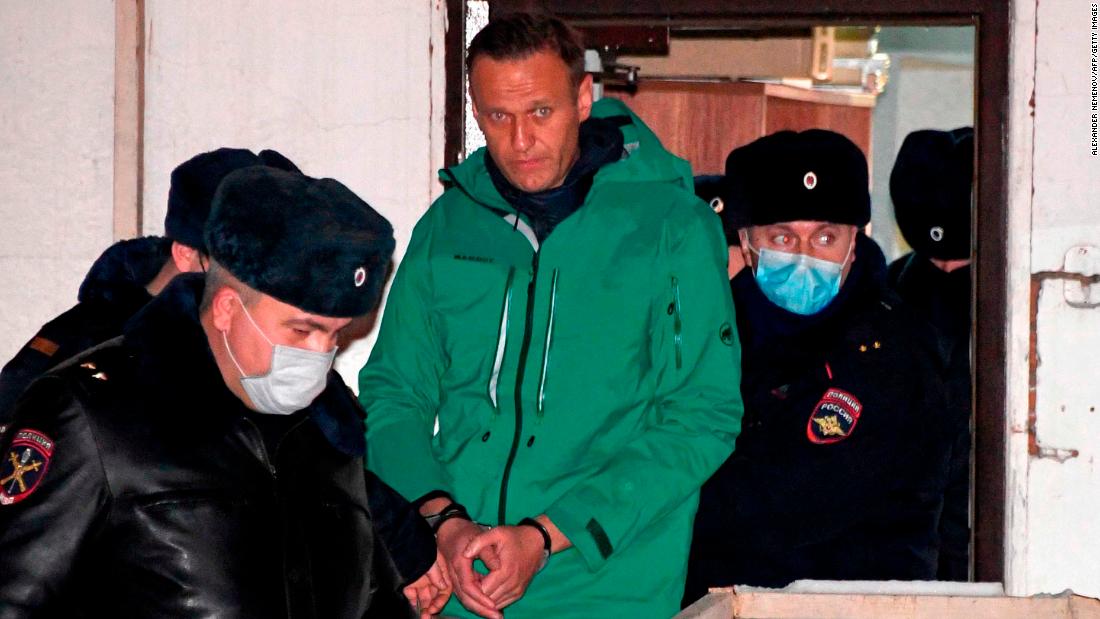Navalny appeared via video link to the court in the city of Khimki, on the outskirts of Moscow. He is still being held at the Matrosskaya Tishina detention center, in the northeast of the capital.
Navalny was placed on the country’s federal wanted list last month for violating the terms of the 2014 fraud trial, which he dismissed as politically motivated.
His next court date is currently scheduled for February 2, when a court will decide whether his suspended sentence of three and a half years on charges of fraud should be converted into a prison sentence due to the Russian authorities’ violation of the terms of his suspended sentence. sentence.
The judge ruled in the appeal hearing on Thursday that Navalny’s detention was legal and that the opposition leader would remain in custody.
Navalny’s reaction to hearing the decision suggests he would expect it. “Everything was clear to me even before the trial,” he told the court.
The politician has previously complained about violations of legal procedures and the lack of opportunity to communicate with his lawyers since his arrest on January 17.
“Everything is so wonderful here that I do not even know where to start. As usual it works: you make a court decision, look at violations of the law and talk about it when you appeal. And here everything is one big violation of the law, ‘Navalny said.
In his final statement, Navalny urged protesters to keep coming out.
“This is the last hurdle that prevents the rulers from stealing everything. They are the real patriots,” he said. “You will not be able to intimidate us – we are the majority.”
According to his associates, Russian law enforcement officers searched Navalny’s Moscow apartment and its headquarters on Wednesday.
The raids took place when Navalny’s allies called for a second round of nationwide protests without sanctions, scheduled for Sunday, to demand the activist’s release from custody.
This past weekend, tens of thousands of Russians took to the streets, which according to the monitoring group OVD-Info resulted in almost 4000 arrests.
Tycoon urges US pressure on Putin
Mikhail Khodorkovsky, a former oil tycoon who was once Russia’s richest man, spent more than ten years in a Russian prison after falling out with Putin.
Speaking to CNN from exile in London, he urged US President Joe Biden to put pressure on Russian President Vladimir Putin’s inner circle to help save Navalny from a similar fate.
“Personal sanctions should be imposed by President Biden and others in the West against those closest to Putin,” he told CNN. “It will be extremely painful for Putin’s entourage and will affect the stability of his power.”
Khodorkovsky ran the Russian oil giant Yukos until 2003. He was later convicted of tax evasion and fraud – charges he said were politically motivated – and jailed.
“Looking back, I was one of the lucky ones. I lost a decade of my life in prison, but others who challenge Putin paid a much higher price,” he told CNN.
The list includes Anna Politkovskaya, one of Russia’s most prominent journalists and Kremlin critics. She was shot dead in 2006. There have been numerous arrests, two trials and five convictions, including three Chechen brothers, but it is still unknown who ordered her murder. The Kremlin denies any connection to the assassination.
In 2015, Russia’s former deputy prime minister Boris Nemtsov, then the most visible leader of the Russian opposition, was shot down on a Moscow bridge inside the Kremlin. Five Chechen men have been jailed for his 2017 murder.
Former Russian agent Alexander Litvinenko has died in 2006 after being poisoned with a rare radioactive isotope, polonium-210. A British investigation in 2016 concluded that Putin had probably approved the operation by two Russian agents to kill the former spy. Russia motivated the British inquiry as political.
US has ‘deep concern’ for Navalny
The US State Department has called on Russia to release all those arrested during protests in the country over the weekend and for the immediate and unconditional release of Navalny.
US Secretary of State Tony Blinken said on Wednesday that Biden’s government was reviewing Russian “actions that are of deep concern to us, whether it is the treatment of Mr Navalny and in particular the apparent use of a chemical weapon in an attempt to kill him. ‘
Biden spoke to Putin on Tuesday for the first time since he became US president, White House press secretary Jen Psaki said, citing Navalny’s poisoning.
“I do not want to get ahead of where we are on the reviews,” Blinken said. “But as I say, we have deep concerns about the safety and security of Mr Navalny, and the bigger point is that his voice is the voice of many, many, many Russians, and it must be heard, not muzzled. “
Blinken told reporters he “excludes nothing, but we want to have this full review done, and then we’ll take it from there.”
He also reiterated his comments from his confirmation hearing in the Senate that ‘it remains striking to me how concerned, and perhaps even afraid, that the Russian government of one man, Mr. Navalny, it seems. ‘
Mary Ilyushina of CNN reported from Moscow and Laura Smith-Spark wrote in London. Anna Chernova contributed to this report.
